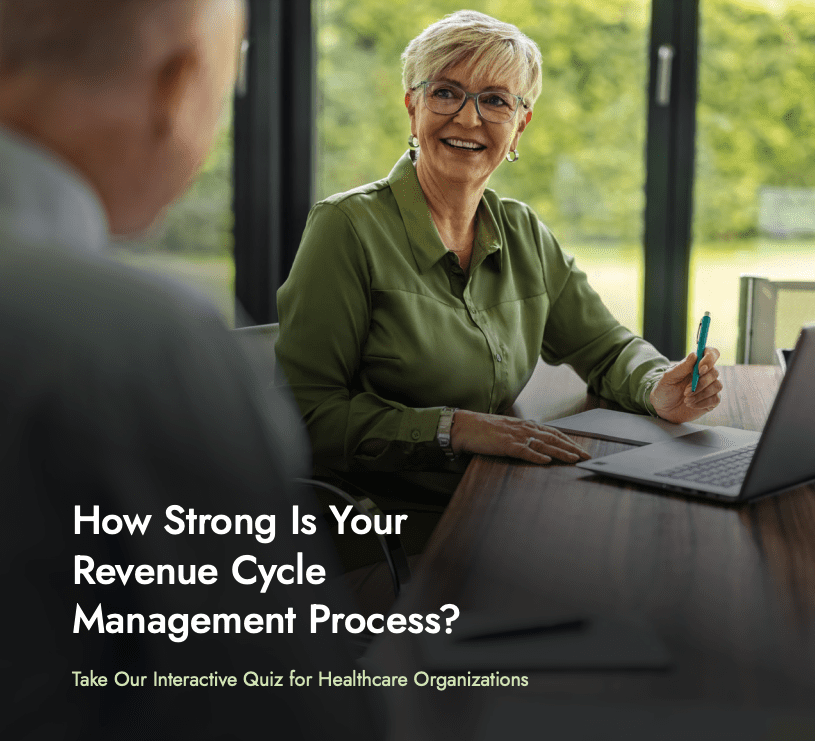The healthcare revenue cycle process is more complex than ever. Healthcare leaders face constant changes in regulations, billing rules, payer requirements, and technology. To keep up with all of it, your staff needs constant training.
Fortunately, there’s a big return on investment. “Organizations that devote time and resources to staff education perform at higher levels and have better revenue cycle metrics,” affirmed Richard L. Gundling, senior Vice President of Professional Practice at the Healthcare Financial Management Association (HFMA).
You can provide training in a variety of ways — web-based or in-person, printed or digital. “Find the right methods that work for your revenue cycle team,” recommended Gundling.
ROI of healthcare revenue cycle education
If your revenue cycle staff has the skills to do their jobs well, they’ll take ownership and pride in their roles. “That translates to more than dollars for an organization,” said Abby Behm, Director of Revenue Cycle Academy at Stanford Health Care.
Higher performance quality
By investing in revenue cycle training, organizations will see benefits that can be measured in dollars, such as decreased denials and cleaner claims. There are also qualitative benefits, like fewer billing complaints. “One of the most impactful benefits of a quality training program is increased employee engagement,” said Amy Hayes, Senior Director of Revenue Cycle at Great Plains Health.
Experienced learners want to develop their revenue cycle expertise. Entry-level learners want to do their job with confidence. “We cater to both styles,” said Amber Hermosillo, Revenue Cycle Education and Quality Director at Banner Health.
Better retention
As many as 58% of medical practices said that staffing is their biggest challenge for 2023, according to an MGMA Stat poll. “Turnover and new hires in positions ranging from front desk to billers, coders, and collections often lead to revenue cycle errors and upfront denials,” said Andrew Hajde, CMPE, Director of Content and Consulting at MGMA.
Well-trained staff who feel confident and skilled are likely to stay in their positions. “It is more important than ever to keep the staff that we have,” emphasized Hermosillo.
Top 10 healthcare revenue cycle training priorities with the best ROI
What training topics are the most important for the healthcare revenue cycle in 2023? Here are the top educational priorities identified by revenue cycle leaders:
1 – The basics of how to submit a “clean” claim
“Doing it right the first time minimizes do-overs,” said Pete Kraus, CHAM, CPAR, FHAM, Business Analyst for Revenue Cycle Operations at Emory Hospitals in Atlanta.
2 – Financial consequences of registration errors
Staff members might not realize that an entire claim can be denied just because they selected the incorrect insurance. Kraus suggested these steps:
- Managers should provide a weekly report of denied claims (and the dollars those represent) to all revenue cycle staff.
- Staff should review why specific claims were denied.
- Managers can provide additional training to staff members who have a pattern of errors.
3 – Updates to payer requirements
“Requirements are changing rapidly with the multitude of payers,” said Hayes. Educating staff about these changes is imperative for the overall financial health of the organization.
“It’s hard even for experts to keep up. Some payers are deliberately capricious,” said Kraus. Some health plans are refusing to pay claims due to missing documentation to support the need for a procedure. Managed care specialists, denial specialists, and information services staff can help get the word out about such unexpected issues.
Some systems warn staff when critical payer requirements are missing (such as a prior authorization). In these cases, staff can make the necessary edits before the claim is sent out and potentially avoid a denial.
Leaders can also hold standing 15-minute meetings to update all staff on the latest payer changes. “Follow-up notes for each meeting can be in the form of ‘cheat sheets’ or procedural updates permanently accessible for staff reference,” suggested Kraus.
4 – How to help patients needing financial assistance
Revenue cycle staff members need specialized training to assist patients with the financial aspects of their care. “This alleviates some of the patients’ anxiety,” said Lora Redden, Senior Director of the Patient Financial Experience at Texas Health.
Patient access and billing staff should send a consistent message to patients. “Our pre-service processes are aligned with our post-service processes, so the message is the same,” added Redden.

More articles in this series
10 Steps To Optimize Your Revenue Cycle Management →
Top 10 Training Priorities for the Healthcare Revenue Cycle →
Optimizing Revenue Cycle Management and Clinical Documentation Integrity To Avoid Coding Disasters →
Revenue Cycle Management Outsourcing: Training Must Be Top of Mind →
5 – Denial prevention and management
Well-trained revenue cycle specialists are more likely to bill correctly. If a denial does happen, though, they need to know how to appeal it. “Clean claims should be a priority. But efficient follow-up is equally important,” said Hayes.
6 – Post-pandemic changes
Educate staff members who are new to healthcare (or new to the organization) about what leniencies were granted during the COVID-19 public health emergency (PHE) — and which standard practices are now being reinstated. “This is vital throughout the revenue cycle,” said Hayes.
7 – CPT Evaluation and Management code and guideline changes
To obtain reimbursement, coding must be correct. Codes changed in 2023 for emergency, observation, and inpatient hospital services. “This will require additional education for coding, CDI [clinical documentation integrity teams], and providers,” said Hayes.
8 – Best practices from the healthcare revenue cycle field
Your staff needs education on day-to-day operations. But there’s a bigger picture. “Industry knowledge can ignite innovative minds,” said Hermosillo. Her department covers the cost of staff to attend approved conferences and networking events and reimburses staff for obtaining certifications from HFMA, National Association of Healthcare Access Management, and the American Health Information Management Association.
Revenue cycle staff members then educate colleagues on best practices. “This can lead to some impressive wins,” said Hermosillo. Recently, her staff shared some new developments in automation, resulting in changes to the department’s operations. “We created multiple bots to save time and apply accurate information,” reported Hermosillo.
9 – Critical thinking skills
As the revenue cycle incorporates more automation, simple tasks will no longer require human intervention. Because of that, tasks assigned to staff will be more complex. “Focusing on critical thinking and problem-solving ensures that our teams are equipped with the right tools to do the work,” said Behm.
10 – A comprehensive understanding of the healthcare revenue cycle
“We have seen the most ‘bang for our buck’ in overarching revenue cycle training,” said Behm. Staff members learn how each task affects the next person’s job and allows the organization to receive revenue.
Comprehensive education creates a holistic understanding of the healthcare revenue cycle process. “Staff are less likely to blame another department just because they don’t understand what is done there,” explained Behm.
How to prioritize your staff education
Understanding what to tackle first can be daunting. Along with the priorities mentioned here, performing a gap analysis to understand the biggest risks or liabilities in your organization could help illuminate the areas to address for the most immediate and impactful improvement. Target these areas by selecting the appropriate education to add to your staff’s training plans.

How strong is your revenue cycle management process?
How do you know if your revenue cycle and coding processes are optimal? Our guide can help provide insights to direct you in your organization’s analysis. Compare metrics such as your claim submission time and claim denial rate to industry averages and learn what parts of the revenue cycle to address with high quality education.
Download guide →





